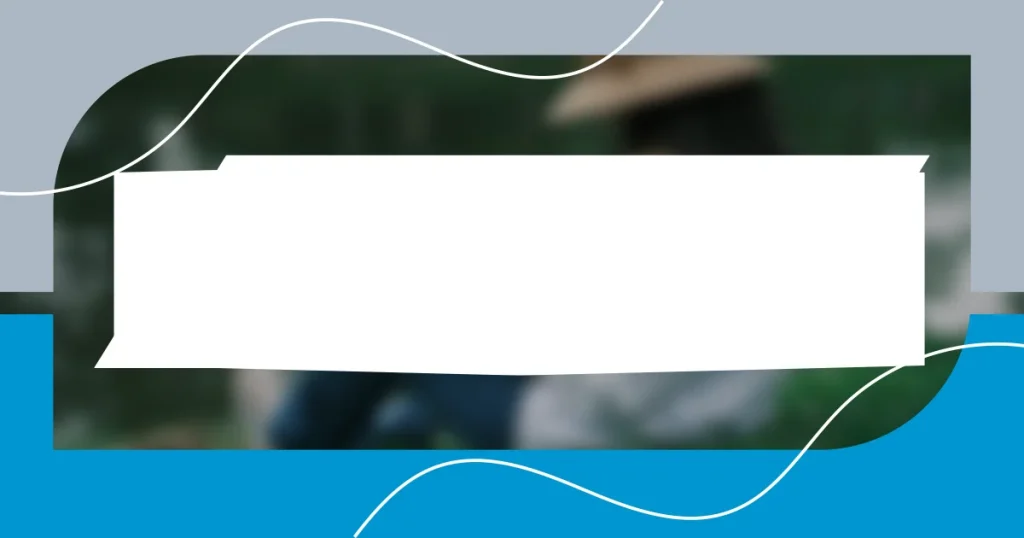Key takeaways:
- Introspection is crucial for discovering personal interests and evolving passions, often linked to memories and experiences.
- Exploring various genres and recognizing influences from friends, culture, and market trends helps shape a writer’s unique voice and niche.
- Committing to a specific genre, while embracing challenges, enhances the intensity of writing and encourages deeper exploration of themes and emotions.

Understanding personal interests
Understanding personal interests begins with introspection. I can recall the moments when I felt most alive—like that time I discovered a love for storytelling during a camping trip with friends, where sharing ghost stories by the fire ignited a spark in me. Have you ever experienced a similar moment that made you feel completely engrossed in something?
As I explored various activities, I realized that passion often lies hidden beneath layers of expectation. It wasn’t until I tried my hand at painting, a hobby I initially dismissed as trivial, that I truly understood joy in creativity. This revelation made me wonder: what if some of our most cherished interests are the ones we overlook because they don’t fit conventional molds?
I’ve also found that my interests evolve over time, shaped by experiences and emotions. The thrill of discovering a new genre of music often brings back the excitement of dancing with friends in a college dorm, reminding me that these interests are deeply tied to our memories. Isn’t it fascinating how much our personal interests reflect our journeys?

Exploring various genres
Diving into different genres is like embarking on a treasure hunt, where each new title can potentially lead to an unexpected passion. I vividly remember browsing through a small, cozy bookstore on a rainy afternoon, where I stumbled upon a collection of eerie short stories. As I flipped through the pages, I felt a rush of nostalgia; those haunting tales echoed the thrilling experiences of night-time book readings with my family, fueling my desire to unearth more hidden gems across various genres.
When I began to explore, I made a list of genres that piqued my interest, and that made all the difference:
- Science Fiction: I was captivated by the imaginative worlds and technological wonders.
- Historical Fiction: This genre painted vivid pictures of bygone eras, tempting me to learn more about the past.
- Fantasy: The allure of magic and epic quests always felt like a thrilling escape from reality.
- Mystery/Thriller: The adrenaline rush from piecing together clues fascinated me and kept me on the edge of my seat.
- Non-Fiction: I found myself drawn to real-life stories that sparked my curiosity and broadened my horizons.
Each genre not only opened my eyes to different storytelling techniques but also reflected aspects of my own life and experiences. Exploring these genres made me realize how a single book can touch our hearts in various ways, often influencing our perspective in life.

Identifying key influences
Identifying the key influences in my journey has been a vital step in uncovering my niche genre. I remember chatting with a friend who introduced me to their favorite authors, and it was like a light bulb went off. Suddenly, I found myself captivated by the styles and themes they loved, and it dawned on me how deeply my friends’ tastes could shape my own. Have you ever had someone recommend a book that completely changed your viewpoint? Reflecting on that conversation led me to notice patterns in the genres I gravitated toward.
As I delved deeper into my reading life, I began to recognize how certain themes resonated with me personally. For example, my fondness for coming-of-age stories stems from my own experiences navigating the complexities of youth. Those narratives serve as mirrors, reflecting the emotions and challenges I faced while growing up. It’s incredible how literature can echo our lives, isn’t it? The more I explored, the clearer it became that my influences weren’t just random—they were intrinsic to my identity as a reader and writer.
Another significant influence comes from the culture around me, including music and films. There was a time when I found solace in indie films and their often poignant storytelling. The raw, unfiltered emotions portrayed in those films fueled my desire to explore similar themes in my writing. I think it’s crucial to consider how our environment shapes us. Are there particular films or songs that have lit a fire in you? These reflections on varied influences have led me to appreciate how interconnected our tastes can be and how they guide us toward our true passions.
| Influence Type | Impact on Genre Discovery |
|---|---|
| Friends’ Recommendations | Helped me find new authors and broaden my reading spectrum |
| Personal Experiences | Informed the themes I resonate with in stories, making them relatable |
| Cultural Context (film/music) | Enhanced my appreciation for emotional narratives and thematic depth |

Analyzing market trends
Recognizing market trends has been pivotal in my journey to discover my niche genre. For instance, I recall attending a local book fair where many emerging authors showcased their work. Observing which genres drew the largest crowds provided me with valuable insights. It made me wonder—what captivated readers so much? I realized that understanding these trends wasn’t just about popular titles; it was about connecting with what readers were genuinely excited about.
Diving deeper, I began to follow genre-specific blogs and social media channels. There’s a sense of community in these spaces that I found invigorating. I remember reading a vibrant discussion about the rise of speculative fiction, which fascinated me. People shared personal stories about why they gravitated towards this genre, revealing its emotional resonance. It struck me that trends often reflect broader cultural movements and collective sentiments—have you noticed how certain genres seem to rise alongside social conversations? This synchronicity guided me to explore genres that felt culturally relevant.
Lastly, analyzing bestseller lists has offered me a fascinating glimpse into shifting reader preferences. When I first discovered how quickly young adult fiction rose in popularity, it sparked my curiosity about why that shift occurred. I remember thinking about the themes of identity and belonging that resonate deeply with so many readers today, including myself. This exploration helped me shape my own writing style, urging me to include impactful themes that speak to the current generation. Through these analyses, I found that embracing market trends is not just a strategy; it’s a way to stay connected with the pulse of what readers truly crave.

Testing out different styles
Trying out different writing styles can be a transformative journey. I vividly recall the time I decided to experiment with poetry after years of writing prose. At first, I felt out of my comfort zone, but that exploration uncovered a new layer of expression within me. Have you ever tried to express your thoughts in a form that felt completely foreign? The fluidity of verse allowed me to tap into emotions I didn’t know I had.
As I continued to test styles, I stumbled upon creative nonfiction. Writing personal essays felt like a revelation. I remember sharing one about my travels, revealing not just what I saw but how those experiences shaped me. It was an exhilarating process, almost like holding a mirror to my own soul. In what ways do you think your experiences could be told through a different lens? For me, crafting those narratives deepened my understanding of my voice and the stories I wanted to tell.
There were moments when I played with various genres, like blending fantasy elements into realistic settings. I once wrote a short story that fused everyday life with magical realism, where mundane activities intertwined with extraordinary events. That mix sparked a creative fire, challenging conventional storytelling. Have you thought about how combining ideas could unveil entirely new narratives? I found that stepping outside of traditional genres opened up a world of possibilities, ultimately leading me to discover my true niche.

Finding your unique voice
Finding your unique voice is an essential part of the writing process, and it often takes deeper self-exploration. I remember the first time I read a piece of writing that resonated with me on a personal level. It had a raw honesty that inspired me to dig into my own experiences. That moment made me question—what stories are hidden within my own life? I realized that tapping into my authentic self not only enriched my writing but also allowed my voice to emerge clearly and powerfully.
In my quest for authenticity, I experimented with various narrative styles. One day, while revisiting past journal entries, I noticed the vivid emotions I conveyed. I decided to weave those feelings into my stories. This approach transformed my writing; suddenly, it wasn’t just about plots and characters, but also about conveying the complexities of human experience. Have you thought about what personal moments could bring depth to your narratives? I encourage you to explore this—weaving personal threads into fictional tales can create an undeniable connection with your readers.
As I continued refining my voice, I found that surrounding myself with like-minded writers was incredibly beneficial. I joined a writing group, where sharing work and receiving feedback showed me how others perceive my style. They often pointed out elements I hadn’t considered, such as the interplay of humor and heartbreak in my stories. This feedback not only boosted my confidence but also encouraged me to embrace my quirks. Isn’t it fascinating how collaboration can unlock facets of our writing we didn’t know existed? Embracing my unique quirks ultimately has shaped my voice, and it’s part of what makes my writing distinct.

Committing to your niche genre
Committing to a niche genre isn’t just a decision; it’s a declaration of who you are as a writer. I remember the moment I decided to focus on psychological thrillers. The decision felt both thrilling and daunting, as I had to dive into darker themes and complex characters. Have you ever felt that tingle of excitement combined with the fear of venturing into the unknown? Committing to that focus allowed me to fully explore the human psyche while venting my own complexities through my characters.
Once I settled into my niche, I found that my writing gained a new intensity. I started to notice how my experiences shaped my understanding of suspense and tension. For instance, after attending a chilling true crime podcast, I felt a surge of inspiration that fueled my writing. Would you believe how a single experience could lead to an explosive creative breakthrough? The depth of that commitment not only sharpened my narrative tools but also connected me to fellow enthusiasts who shared similar passions.
Staying committed to my niche has also meant facing challenges that demand reflection and growth. There are days when I doubt my capacity to create compelling stories within the genre. In those moments, I remind myself of the vibrant discussions I’ve had with readers who share my enthusiasm. Their insights often rejuvenate my passion, making me realize that by honing in on a niche, I’m part of a larger conversation. So, how do you keep the flame alive in your writing? For me, it’s all about allowing that commitment to inspire greater exploration and unexpected ideas.
















